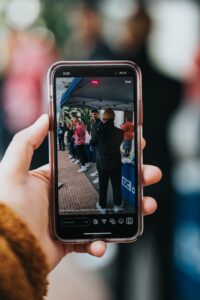Events are back, and there is no slowing down for brands. In our post-pandemic world, events have recovered, with this form of marketing rapidly becoming an essential marketing strategy for driving consumer engagement and purchase intent.
If your brand hasn’t implemented eventing marketing into its marketing strategy, you should start now—according to research conducted by Bizzabo, 95% of marketers say live events enable real connections.
As marketers, we know the importance of building relationships and how this contributes to increasing consumer retention. Events also provide B2B marketers with an excellent opportunity to increase leads and drive them down the sales funnel.
Keep reading this post to learn more about event marketing trends to implement in your event marketing strategy so your brand can reap the rewards.
There is a digital transformation happening with events.
Nowadays, marketers need to think about in-person and digital attendance regarding events. Digital trends drive the event marketing industry—by 2026, the global events industry is projected to reach $2.3 BILLION.  Post-pandemic, it makes sense that in-person events are popular, especially now that restrictions are no longer an issue. However, marketers need to incorporate digital aspects into events because, as we know, the pandemic has changed how companies do business in the B2B and B2C realms.
Post-pandemic, it makes sense that in-person events are popular, especially now that restrictions are no longer an issue. However, marketers need to incorporate digital aspects into events because, as we know, the pandemic has changed how companies do business in the B2B and B2C realms.
Virtual events are not going anywhere, and marketers should be glad because not only does this help boost attendance, but adding the option to attend virtually and other digital aspects to your events can expand your consumer base even more.
Consumers will appreciate your brand catering to a broader audience, providing greater accessibility, and making your brand appear more modern. According to Forrester Wave: B2B Event Management Technology, Q1 2023 report, 67.8% of attendees said their favorite event format was in-person or hybrid.
With hybrid events, brands can reach and target audiences online more effectively than traditional in-person events because online advertising allows you to target audiences in different cities, states, demographics, etc.
Marketers considering implementing digital aspects to their event marketing strategies should remember that it needs to make sense for their brand, and potential buyers should learn something from the event experience.
Events should be an educational experience for consumers, whether in-person or virtual. Knowing how to best integrate digital into your event marketing will be crucial to the customer experience throughout the pre-event, during, and post-event periods.
Deeper event engagement will determine your success rate.
Events are not a surface-level marketing strategy—brands must continuously engage with their consumers to develop trusting relationships between buyers and sellers. Marketers can boost potential prospects’ brand and customer experience by creating deeper engagement.
When brands are interested in developing relationships that go past the surface level, marketers will see a higher rate of success in the buyer’s journey and an increase in revenue.
Event marketing is an excellent solution for increasing engagement and strengthening customer relationships because brands actively interact with potential prospects at events, ultimately creating a memorable experience.
As marketers, we know that driving the buyer down the sales funnel is essential to increase revenue, but creating memorable experiences not only increases the likelihood of purchase intent but also increases brand awareness, customer loyalty, and trust.
Reminding potential prospects about what occurred at the event once it’s over is another great way to keep them engaged and interested in your products or services. Brands can use webinars, virtual events, or on-demand video content from a past event to keep the momentum and increase engagement.
Using other marketing channels to connect with consumers and pique their interest also helps create memorable experiences that can translate into revenue and consumer retention.
Book a quick strategy call with our marketing experts!
Implement personalization with the help of event data.
Data is essential and even more critical when tracking event insights. Every marketer knows the significance of data and how this determines the success rate of any marketing content you produce.
Tracking event data will give marketers better audience targeting abilities and improve personalization per customer.
Because we live in a digitally savvy world, technology has made tracking event insights much easier for marketers. When planning and strategizing for your brand event, marketers have more digital tools available to implement throughout the event journey and collect consumer data more accurately.
Event marketers can collect data during the event journey through paid search, email marketing, live polls, Q&A sessions, chatbots, or social media hashtags. These are some of the digital marketing tools that help marketers measure engagement and other insights.
Ultimately, event marketers will want to gather enough valuable consumer data to build an audience-centric marketing strategy to develop content, target consumers better, and create a more personalized customer journey. Making data one of the most significant event marketing trends to an organization’s success.
Video technology is becoming increasingly popular at events.
Technology will play an even more significant role in event marketing, and marketers should be current with the available technologies.
As marketers, you have heard the term MarTech, a combination of marketing technology. It refers to digital marketing tools and technologies businesses use to streamline, automate, and optimize their marketing efforts. Since events are becoming a favorite strategy amongst brands, event technology is also becoming a part of MarTech.

With different marketing tools becoming more readily available for marketers, such as live streaming, video conferencing tools, etc.— 86% of event marketers think technology can positively impact events and make events more accessible to wider audiences, thus increasing a brand’s chances of achieving a higher ROI and engagement.
There are many types of technology, but one medium is and will continue to become a popular choice for marketers—video technology.
The preference for video from audiences and brands is partly due to the rise of video streaming services, improved video quality, and a greater demand for video.
Audiences prefer watching videos to access information or instructional content—this is great for event marketers because educational content is a large part of events.
Video also provides audiences the freedom to watch content wherever they prefer, and this has been a trend now for a while, thanks to social media and streaming services.
So, if you haven’t already, it’s time for marketers to integrate video technology into their event marketing strategy because you will see an increase in engagement and ROI. Brands will also earn the trust of brands that continue implementing event marketing trends into their content.
Are you interested in event marketing strategies? Skyline Studio is here to guide you through the events process. Just drop your information below to start developing branded events.
Book a quick strategy call with our marketing experts!